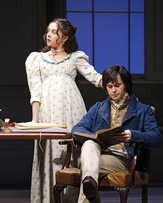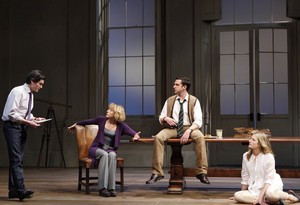SITE GUIDE
SEARCH
REVIEWS
REVIEW ARCHIVES
ADVERTISING AT CURTAINUP
FEATURES
NEWS
Etcetera and
Short Term Listings
LISTINGS
Broadway
Off-Broadway
NYC Restaurants
BOOKS and CDs
OTHER PLACES
Berkshires
London
California
New Jersey
DC
Connecticut
Philadelphia
Elsewhere
QUOTES
TKTS
PLAYWRIGHTS' ALBUMS
LETTERS TO EDITOR
FILM
LINKS
MISCELLANEOUS
Free Updates
Masthead
A CurtainUp Review
Arcadia
By Elyse Sommer
|
A Sampling of Arcadia's Witty Dialogue There is nothing more to be said about sexual congress.— Septimus Is it the same as love?— Thomasina Oh no, it is much nicer than that.— Septimus It is a defect of God's humour that he directs our hearts everywhere but to those who have a right to them. — Lady Croom. When Septimus wants to keep Thomasina out of earshot of some adult talk, Lady Croom wrily states Let her stay. A lesson in folly is worth two in wisdom. By counting our stock. Seven plays from Aeschylus, seven from Sophocles, nineteen from Euripides my lady! You should no more grieve for the rest than for a buckle lost from your first shoe, or for your lesson book which will be lost when you are old. We shed as we pick up, like travellers who must carry everything in their arms, and what we let fall will be picked up by those behind. The procession is very long and life is very short. We die on the march.—Septimus Your tea's getting cold.—Valentine I like it cold.— Hannah I'm telling you something. Your tea gets cold by itself, it doesn't get hot by itself. Do you think that's odd? Well, it is odd. Heat goes to cold. It's a one-way street. Your tea will end up at room temperature. What's happening to your tea is happening to everything everywhere. The sun and the stars. It'll take a while but we're all going to end up at room temperature— Valentine |

Bel Powley and Tom Riley
(Photo: Carol Rosegg) |
Among the ideas tumbling out of this pinata are first love, historians' research methods, landscape design, sexual infidelity, class, mathematics, physics, thermodynamics, computer algorithms, fractals, population dynamics, chaos theory versus determinism romanticism versus classicism, the end of the universe. The players grappling with this multitude of ideas populate two interconnected stories set in a great country house in two century spanning eras, with the characters from the two periods alternating on stage and at one time, coming together.
If all this sounds very complex and erudite, it is — but it's also enormously funny and entertaining. Whether you have enough of a physics and math background to get all the theoretical stuff and the connection between fractal patterns and Arcadia's structure, this is a play that can, as Lizzie Loveridge explained in her 2009 review of David Leveaux's excellent production please a wide spectrum of theater goers (review). Fortunately for New Yorkers, that production has transferred to Broadway, with a different but excellent cast.
Stoppard's brilliance stems not from his math and science expertize but his clever plotting, astute characterizations and witty wordplay; as well as his ability to use immaculate research to satisfy audiences who like theater that grapples with specialized subjects without leaving those ufamiliar with them feeling adrift. As the characters of the past and near present stories merge towards the end of the play, with the contemporary characters dressed for a costume ball and thus looking like their ancestors, so the playwright has managed to merge erudition and entertainment. Even the most fun focused theater goers are bound to expand their mental horizons listening to the mutli-faceted dialogue which in Arcadia ranges over algebra and algorithms, fashions in garden design, as well as the unseen Byron's and the visible and very talkative characters' peccadilloes .
The play opens in 1809 with 13-year-old Thomasina Coverley (Bel Powley), being tutored by the attractive young Septimus Hodge (Tom Riley), an occasional literary critic. He's not averse to making the most of his sexual charisma with Lady Croom (Margaret Colin), Thomasina's garden obsessed mother and the unseen wife of Ezra Chater (David Turner), an untalented visiting poet, but he's prim when it comes to his pupil who, though more than smart enough to concentrate on Fermat's last theorem, is currently more interested 's in the meaning of "carnal embrace" — especially in relation to him. The story during this period also involves a visit to Sidley Park from his friend Lord Byron who's never seen though there is much talk of his dalliances.

l-r: Billy Crudup, Lia Williams, Raoul Esparza, Grace Gummer
(Photo: Carol Rosegg) |
While everyone figures importantly in the cross-cutting events, the focal puzzle connecting past and present comes courtesy of yet another of the modern day characters, an academic ambitious for literary celebrity named Bernard Nightingale (Billy Crudup), a name which at the time Stoppard wrote Arcadia was a sly nod to London Times critic Benedict Nightingale. Besides insinuating himself into the Sidley Hall scene as an insulting know-it-all and sexual predator, Nightingale becomes convinced he has made "probably the most sensational literary discovery of the century" about what happened all those years ago between the cuckolded husband Ezra Chater and the visiting Lord Byron that led to the latter's hasty retreat. But as Stoppard pushes Bernard's mean spirited yet amusing insults of the other characters' scientific endeavors to the point of his declaring himself willing "to push the lot of you over a cliff myself" he also manages to push the insulter over the cliff by exposing his ineptitude as a researcher. In the same way Stoppard manages to bring all the threads that tie all characters together not just with a feast of mind boggling theorizing but through a more personal story — a story that essentially tells us that no matter what patterns of chaos may overtake us, our lives will always be controlled by the pattern of our human connections.
As having Ed Stoppard, the playwright's thespian son, playing Valentine Coverley added a piquant touch to the London cast so does having Billy Crudup, who was Septimus at the Vivian Beaumont in 1995, now play the opportunistic Bernard Nightinggale. This is also the Broadway debut of another talented Gummer, Mamie Gummer's sister and Meryl Streep's daughter, as Chloë Coverly. And as Arcadia is that rare mix of think piece and hilariously funny entertainment, so the Broadway cast smoothly integrates British and American actors (all, as already mentioned new to this production).
The British members of the cast include Lia Williams, a seasoned and outstanding performer as Hannah Jarvis. Tom Riley, plays Crudup's original role, with impressive nuance and charisma. Interestingly. Up and coming young British actress Bel Powley is a charmingly precocious Thomasina. Unfortunately she seems to have been encouraged to heighten her efforts to be heard in the Barrymore's balcony with the very opposite effect. Her voice comes off as too effortful and high pitched to be crystal clear. Her strained delivery does emphasize the fact that she's portraying a very young, innocent girl with a remarkably mature way of looking at complicated ideas.
As for Crudup in his current role, while he too tends to ratchet up his dialogue to shouting level there's no problem hearing what he has to say. Most importantly he is a deliciously unlikeable Nightingale. The cast overall, whether in big or smaller roles, is outstanding, with no complaints about consistency or authenticity of the British accents.
Hildegard Bechler's beautiful drawing room with its stretch limousine length table and airy windows and French doors leading to Sidley Hall's exterior has transferred beautifully to the tall Barrymore stage. (For a full view of the set see the New York audiences are also treated to a gorgeous curtain painted with an image of the bucolic estate. The rest of the top drawer design team completes the handsome production.
If anything, I liked this revival even better than the original at Lincoln Center. Arcadia definitely holds up on both stage and page (it's available in paperback, by itself or with other Stoppard plays worth reading). Anyone interested in digging more deeply into the math of Arcadia might want to check out a Youtube lecture by mathematician Manil Suri (http://www.youtube.com/watch?v=iM0cR7qvmgY). Alternatively, you could check out one of the 50 Physics Ideas You Really Need to Know that's part of an easy to read, informative series and used by Mr. Stoppard himself when talking to the cast about some of the heady ideas they would be talking about on stage.
Tom Stoppard is also part of Curtainup's Author's Album pages. You'll find our Stoppard Backgrounder here. You may also want to check out our Science and Math Plays Page which includes annotated links to such plays we've reviewed, including a musical about Fermat's Theorem.
|
Arcadia By Tom Stoppard D'irected by David Leveaux Cast: Margaret Colin (Lady Croom), Billy Crudup (Bernard Nightingale), Raúl Esparza (Valentine Coverly), Glenn Fleshler (Captain Brice), Grace Gummer (Chloe Coverly), Edward James Hyland (Jellaby), Byron Jennings (Richard Noakes), Bel Powley (Thomasina Coverly), Tom Riley (Septimus Hodge), Noah Robbins (Gus/Augustus Coverly), David Turner (Ezra Chater) and Lia Williams (Hannah Jarvis). Sets: Hildegard Bechtler Costumes: Gregory Gale Lighting: Donald Holder Sound: David Van Tieghem Music: Corin Buckeridge Choreography: Jodi Moccia Dialect Consultant: Elizabeth Smith Stage Manager: Matthew Lacey Running Time: Approximately 2 hours and 45 minutes, including one intermission Ethel Barrymore Theatre 243 West 47th Street (212) 239-6200. From 2/25/11; opening 3/17/11; closing 6/19/11. Monday through Saturday at 8pm, with matinees Wednesday and Saturday 2pm through March 20, 2011. Beginning the week of March 21, Tuesday at 7pm, Wednesday at 2pm & 8pm, Thursday at 7pm, Friday at 8 pm, Saturday at 2pm & 8pm and Sunday at 3pm. Reviewed by Elyse Sommer at March 12th press preview |
|
REVIEW FEEDBACK Highlight one of the responses below and click "copy" or"CTRL+C"
Paste the highlighted text into the subject line (CTRL+ V): Feel free to add detailed comments in the body of the email. . .also the names and emails of any friends to whom you'd like us to forward a copy of this review. Visit Curtainup's Blog Annex For a feed to reviews and features as they are posted add http://curtainupnewlinks.blogspot.com to your reader Curtainup at Facebook . . . Curtainup at Twitter Subscribe to our FREE email updates: E-mail: esommer@curtainup.comesommer@curtainup.com put SUBSCRIBE CURTAINUP EMAIL UPDATE in the subject line and your full name and email address in the body of the message. If you can spare a minute, tell us how you came to CurtainUp and from what part of the country. |

Slings & Arrows-the complete set
You don't have to be a Shakespeare aficionado to love all 21 episodes of this hilarious and moving Canadian TV series about a fictional Shakespeare Company






